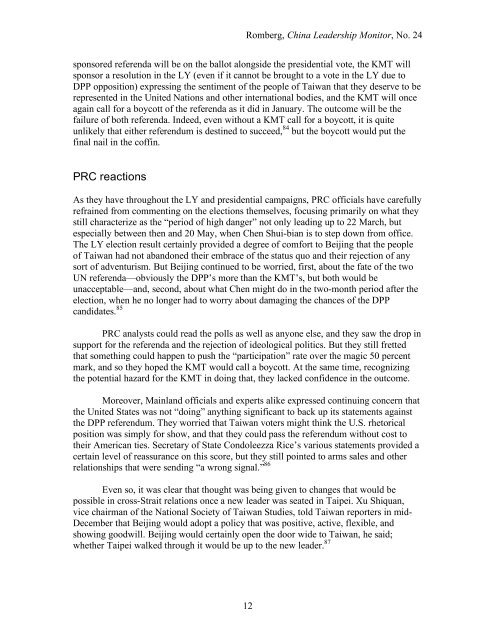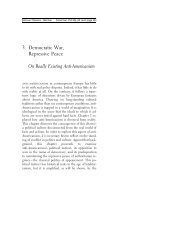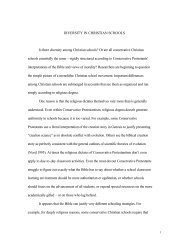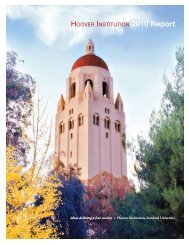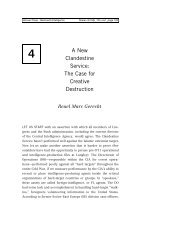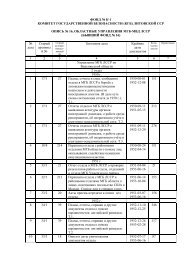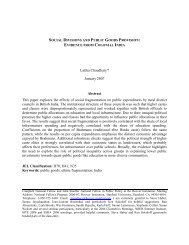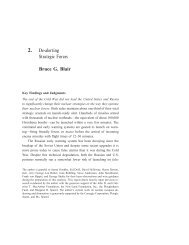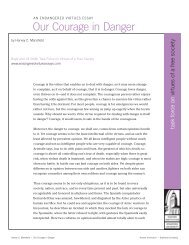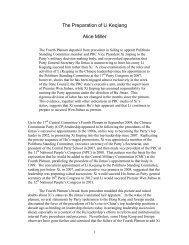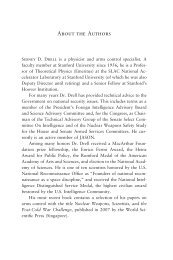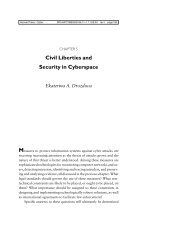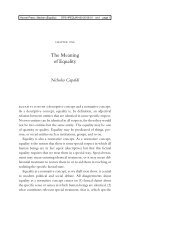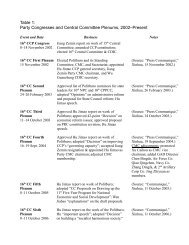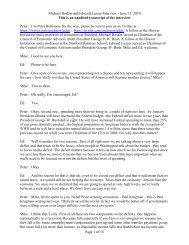Taiwan Elections: Foundation for the Future - Hoover Institution
Taiwan Elections: Foundation for the Future - Hoover Institution
Taiwan Elections: Foundation for the Future - Hoover Institution
You also want an ePaper? Increase the reach of your titles
YUMPU automatically turns print PDFs into web optimized ePapers that Google loves.
Romberg, China Leadership Monitor, No. 24<br />
sponsored referenda will be on <strong>the</strong> ballot alongside <strong>the</strong> presidential vote, <strong>the</strong> KMT will<br />
sponsor a resolution in <strong>the</strong> LY (even if it cannot be brought to a vote in <strong>the</strong> LY due to<br />
DPP opposition) expressing <strong>the</strong> sentiment of <strong>the</strong> people of <strong>Taiwan</strong> that <strong>the</strong>y deserve to be<br />
represented in <strong>the</strong> United Nations and o<strong>the</strong>r international bodies, and <strong>the</strong> KMT will once<br />
again call <strong>for</strong> a boycott of <strong>the</strong> referenda as it did in January. The outcome will be <strong>the</strong><br />
failure of both referenda. Indeed, even without a KMT call <strong>for</strong> a boycott, it is quite<br />
unlikely that ei<strong>the</strong>r referendum is destined to succeed, 84 but <strong>the</strong> boycott would put <strong>the</strong><br />
final nail in <strong>the</strong> coffin.<br />
PRC reactions<br />
As <strong>the</strong>y have throughout <strong>the</strong> LY and presidential campaigns, PRC officials have carefully<br />
refrained from commenting on <strong>the</strong> elections <strong>the</strong>mselves, focusing primarily on what <strong>the</strong>y<br />
still characterize as <strong>the</strong> “period of high danger” not only leading up to 22 March, but<br />
especially between <strong>the</strong>n and 20 May, when Chen Shui-bian is to step down from office.<br />
The LY election result certainly provided a degree of com<strong>for</strong>t to Beijing that <strong>the</strong> people<br />
of <strong>Taiwan</strong> had not abandoned <strong>the</strong>ir embrace of <strong>the</strong> status quo and <strong>the</strong>ir rejection of any<br />
sort of adventurism. But Beijing continued to be worried, first, about <strong>the</strong> fate of <strong>the</strong> two<br />
UN referenda—obviously <strong>the</strong> DPP’s more than <strong>the</strong> KMT’s, but both would be<br />
unacceptable—and, second, about what Chen might do in <strong>the</strong> two-month period after <strong>the</strong><br />
election, when he no longer had to worry about damaging <strong>the</strong> chances of <strong>the</strong> DPP<br />
candidates. 85<br />
PRC analysts could read <strong>the</strong> polls as well as anyone else, and <strong>the</strong>y saw <strong>the</strong> drop in<br />
support <strong>for</strong> <strong>the</strong> referenda and <strong>the</strong> rejection of ideological politics. But <strong>the</strong>y still fretted<br />
that something could happen to push <strong>the</strong> “participation” rate over <strong>the</strong> magic 50 percent<br />
mark, and so <strong>the</strong>y hoped <strong>the</strong> KMT would call a boycott. At <strong>the</strong> same time, recognizing<br />
<strong>the</strong> potential hazard <strong>for</strong> <strong>the</strong> KMT in doing that, <strong>the</strong>y lacked confidence in <strong>the</strong> outcome.<br />
Moreover, Mainland officials and experts alike expressed continuing concern that<br />
<strong>the</strong> United States was not “doing” anything significant to back up its statements against<br />
<strong>the</strong> DPP referendum. They worried that <strong>Taiwan</strong> voters might think <strong>the</strong> U.S. rhetorical<br />
position was simply <strong>for</strong> show, and that <strong>the</strong>y could pass <strong>the</strong> referendum without cost to<br />
<strong>the</strong>ir American ties. Secretary of State Condoleezza Rice’s various statements provided a<br />
certain level of reassurance on this score, but <strong>the</strong>y still pointed to arms sales and o<strong>the</strong>r<br />
relationships that were sending “a wrong signal.” 86<br />
Even so, it was clear that thought was being given to changes that would be<br />
possible in cross-Strait relations once a new leader was seated in Taipei. Xu Shiquan,<br />
vice chairman of <strong>the</strong> National Society of <strong>Taiwan</strong> Studies, told <strong>Taiwan</strong> reporters in mid-<br />
December that Beijing would adopt a policy that was positive, active, flexible, and<br />
showing goodwill. Beijing would certainly open <strong>the</strong> door wide to <strong>Taiwan</strong>, he said;<br />
whe<strong>the</strong>r Taipei walked through it would be up to <strong>the</strong> new leader. 87<br />
12


